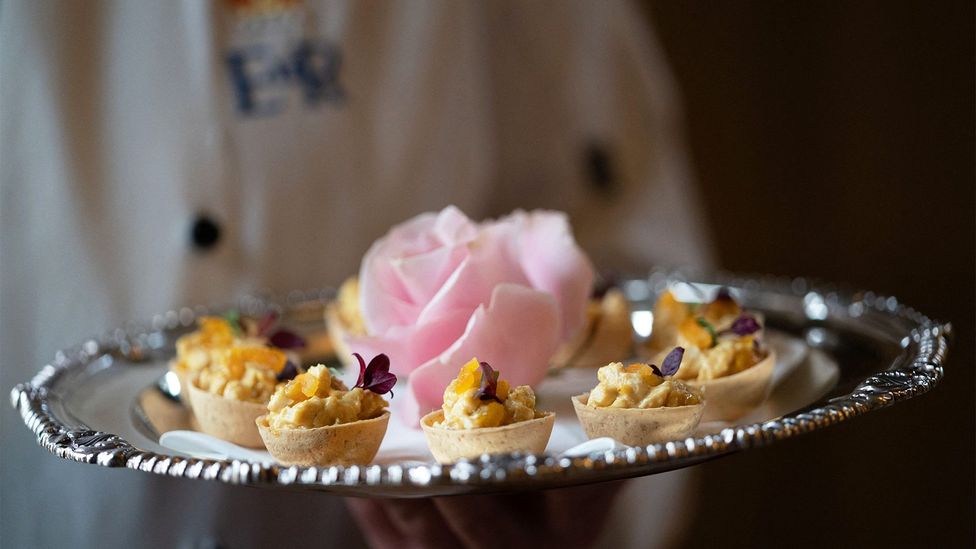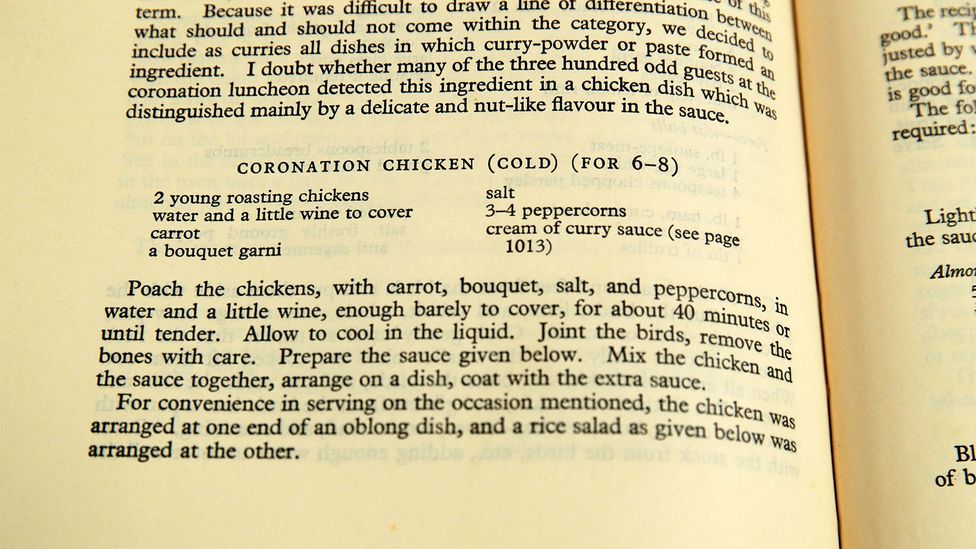Coronation ceremonies for the monarchs of England, Britain and the United Kingdom have a history stretching back more than 1,000 years. While much has changed in that time, one thing has remained constant: food has played a part in the crowning of the new king or queen. Whether it's being served on gilt plates at grand banquets or on trestle tables at celebratory street parties, coronation food has its own fascinating story and can offer a reflection of the time or a first glimpse into the values of the newly crowned king or queen.
An extreme example of excess is the coronation banquet of King George IV. Famous for his extravagant lifestyle and racking up eyewatering debts, his coronation, held on 19 July 1821, was the most expensive in history, costing the equivalent of more than £20,000,000 in today's money.
In Westminster Hall, now the oldest remaining part of the original Houses of Parliament, the king and 300 of the most important guests dined under the gaze of thousands of spectators sitting on specially constructed platforms. Dining elsewhere in the palace were 1,300 other guests. French-style cuisine was served from temporary kitchens constructed to cope with the quantity of food, and the king's table alone had more than 70 dishes over three courses. In total, the guests ate 7.3 tonnes of beef, veal and lamb, more than 1,600 chickens and 8,400 eggs.
Although, as might be expected at an event of this scale, not everything went to plan. The division of huge numbers of people watching a sumptuous feast play out turned out to be a recipe for disaster. After the king left, the spectators descended from their stands and began to eat the leftover food and attempted to take the ornate cutlery, plates and table decorations.
Although coronation banquets had historically been extravagant affairs, King George IV's was the high-water mark. It was the last to be held in Westminster Hall, and William IV's coronation 10 years later didn't feature a banquet at all to economise after George IV's extravagant reign.

Coronation chicken vol-au-vents served at a reception for Britain's Queen Elizabeth II (Credit: Joe Giddens/Getty Images)
In contrast, away from the pomp and circumstance of royal banquets, street parties are a centuries-old way for communities to celebrate a coronation with food and drink.
With the nation still suffering from austerity after the end of World War Two and with some rationing still in place, the coronation of Queen Elizabeth II on 2 June 1953 gave the people an opportunity to come together and celebrate. Thousands of street parties took place up and down the nation, and a bonus ration of one pound of sugar and a quarter of a pound of margarine was distributed over the coronation period so people could make celebratory dishes. Sandwiches with butter, tinned meat or fish would have been popular, and cakes, biscuits, ice cream, soft drinks and jellies were all specifically mentioned in Parliament as being in great demand.
Coronation Chicken, a future street-party favourite, was created for an official lunch of 350 foreign representatives invited to attend Elizabeth II's coronation. The dish, made from chicken poached in water and a little white wine with a sauce containing cream, mayonnaise, red wine and curry powder, was created by Rosemary Hume, Constance Spry and the students at their cookery school, Le Cordon Bleu London.
Spry described the recipe as having a delicate and nut-like flavour and it would have been a luxury at the time due to the expense of many of the ingredients. It exploded in popularity in the 1970s and '80s, and the original recipe has since been reworked many times by celebrity chefs. It can still be found across the UK, although most commonly as a sandwich filling rather than a dish in its own right.

The recipe for coronation chicken printed in The Constance Spry Cookery Book (Credit: Chris Radburn/Getty Images)
Food historian Dr Annie Gray commented that "Coronation food reflects the tastes of the time, in that it is cooked by chefs of a time, with equipment of a time and for people of a particular time." She continued, "Let's also not forget the audience for [coronation] feasts – up until the current monarch [King Charles III], very few people other than the invited guests would have known what was on the menu. This coronation is much more overtly inclusive and therefore carries with it a real opportunity for the new monarch to show his credentials and ethos in the food."
Street parties are set to feature in the coronation of King Charles III and Queen Camilla on 6 May 2023, with the community party planning scheme The Big Lunch providing a coronation party planning pack as part of the official celebrations. The official Coronation website also provides several recipes as inspiration for Coronation Big Lunches, street parties and other celebrations. These include Ken Hom's Coronation Roast Rack of Lamb with Asian-style Marinade, Nadiya Hussain's Coronation Aubergine, Gregg Wallace's Prawn Tacos with Pineapple Salsa, Adam Handling's Strawberry and Ginger Trifle and Martha Collison's Coronation Crown Scones.
King Charles has been outspoken about his support for organic British food, and in the selected dishes, there's a nod to traditionalism with a trifle, a vegetarian choice with a Coronation Chicken-inspired sauce in Hussain's aubergine recipe, and Hom's fusion of English and Asian flavours suggests a celebration of the evolution of British food. The official Coronation Quiche recipe for King Charles III's crowning, by Royal Chef Mark Flanagan, contains spinach, broad beans and tarragon, which is likely a nod to his sustainable agriculture commitment and his purported affinity for eggs and cheese.
Speaking about being invited to contribute a recipe for the official celebrations, chef and restauranteur Adam Handling said, "It's a real honour to have created a recipe for the coronation; it's an iconic moment in our history and I hope lots of people will be celebrating with this recipe."

The coronation of Queen Elizabeth II on 2 June 1953 gave the people an opportunity to come together (Credit: Amoret Tanner/Alamy)
Ken Hom OBE, whose BBC series Ken Hom's Chinese Cookery was instrumental in showing the British how to cook Asian food, spoke about what his recipe represents, saying, "I feel and think my recipe reflects the deep profound changes in British food culture. Former exotic ingredients such as soy sauce are now part of the British pantry. I remember when I worked on my first BBC series in the early '80s, I always added a caveat, if you can't find the authentic Chinese ingredient, you can substitute this. Of course, this is no longer the case. British food culture has embraced the world and it has become enriched. British food is modern world food."
Commenting on the recipes, Gray said, "I admire [the recipe] choices – very carefully chosen in terms of both the food and the named chefs ostensibly behind them… a vegetarian dish, a trifle which we know is popular based on the Jubilee pudding competition, and lamb which is always seen as celebratory. Regional links, global links, seasonal links – it's all there and is a good reflection of Charles III's stated food ethics."
You can find out more about each of the coronation recipes below, including tips on making them:
Coronation recipes:
- Chef Mark Flanagan's coronation quiche
- Nadiya Hussain's coronation aubergine
- Ken Hom's coronation roast rack of lamb
- Adam Handling's coronation trifle
- Gregg Wallace's prawn tacos with pineapple salsa
- Le Condon Bleu London's coronation chicken
- Claire Ptak's brown sugar Victoria Sponge
BBC.com's World's Table "smashes the kitchen ceiling" by changing the way the world thinks about food, through the past, present and future.
---
Join more than three million BBC Travel fans by liking us on Facebook, or follow us on Twitter and Instagram.
If you liked this story, sign up for the weekly bbc.com features newsletter called "The Essential List". A handpicked selection of stories from BBC Future, Culture, Worklife and Travel, delivered to your inbox every Friday.
"fit" - Google News
April 30, 2023 at 10:25PM
https://ift.tt/jX8Yrul
Coronation dishes: The food fit for royalty - BBC
"fit" - Google News
https://ift.tt/aMLCngO
https://ift.tt/iMT4srk
Bagikan Berita Ini














0 Response to "Coronation dishes: The food fit for royalty - BBC"
Post a Comment